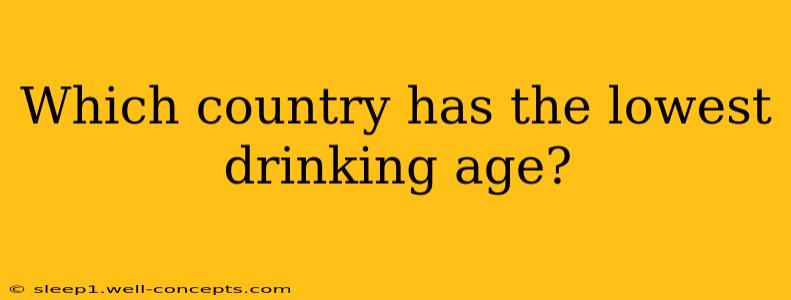Which Country Has the Lowest Drinking Age? A Global Perspective on Alcohol Laws
The legal drinking age varies dramatically across the globe, reflecting diverse cultural norms, public health concerns, and historical influences. While many countries maintain a minimum drinking age of 18 or 21, several nations stand out with significantly lower thresholds. Pinpointing the single country with the absolute lowest drinking age is challenging due to nuances in legislation and enforcement, but we can explore some key examples and the complexities involved.
Countries with Low Drinking Ages:
Several countries permit the consumption of alcohol at ages younger than 18, often with caveats. These include:
-
Niger: While there isn't a universally agreed-upon, explicitly stated drinking age, the general consensus among legal experts and researchers is that there's no legal restriction on alcohol consumption for minors in Niger. This doesn't imply that underage drinking is condoned or that there are no societal implications; rather, it reflects a lack of specific legislation around this issue. It's crucial to understand the cultural context and the potential for informal, unregulated alcohol access.
-
Other African Nations: Similar to Niger, several other African nations lack specific, clearly defined minimum drinking ages. The legal landscape can be ambiguous and enforcement varies widely across regions and communities. Further research into the specific laws of individual countries within Africa is necessary for a conclusive answer.
Important Considerations:
It's vital to acknowledge the significant limitations in definitively answering "which country has the lowest drinking age." The lack of consistent data and clear legislation in certain parts of the world makes a precise answer elusive. Furthermore, even when a minimum drinking age exists, enforcement can be inconsistent, leading to significant variations in practice.
Factors Influencing Drinking Age Laws:
The establishment of minimum drinking ages is often influenced by:
-
Public Health Concerns: Many countries implement higher minimum drinking ages to address alcohol-related health problems such as liver disease, accidents, and fetal alcohol spectrum disorders.
-
Cultural Norms: Societal attitudes toward alcohol consumption play a considerable role. Cultures with long traditions of moderate alcohol use may have different legal approaches than those with a history of alcohol-related problems.
-
Economic Factors: Governments may consider the economic implications of alcohol regulation, including tax revenue and the potential costs associated with alcohol-related harm.
Beyond the Numbers: The Bigger Picture
While identifying the country with the absolute lowest drinking age is difficult, the variations highlight the complex interplay of cultural, social, and public health factors that shape alcohol policy globally. Focusing solely on the numerical age overlooks the critical issues of alcohol accessibility, education, and responsible consumption, regardless of the legal framework in place. Further research is needed to understand the broader implications of differing drinking ages and their impact on public health outcomes.
Disclaimer: This information is for educational purposes only and should not be considered legal advice. Always consult official government sources for the most accurate and up-to-date legal information regarding alcohol consumption in any specific country.

